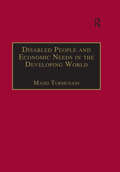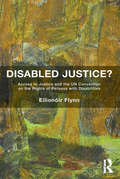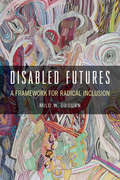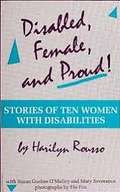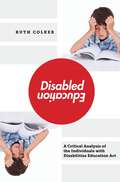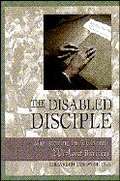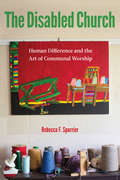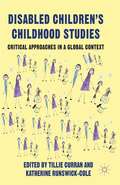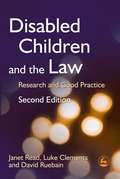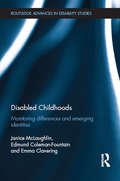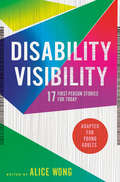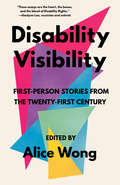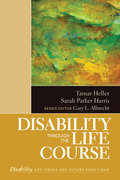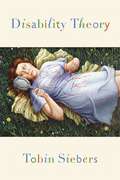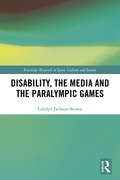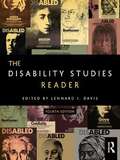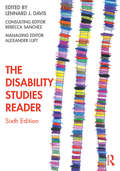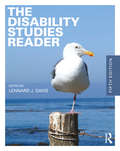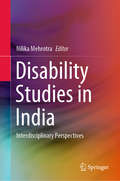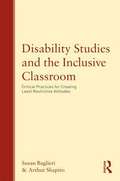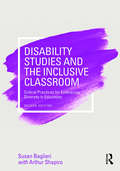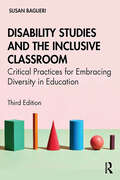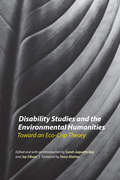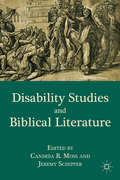- Table View
- List View
Disabled People and Economic Needs in the Developing World: A Political Perspective from Jordan
by Majid TurmusaniThis book explores the economic situation of disabled people in developing countries focusing on rehabilitation and uses particpatory framework to community development. Although dealing specifically with a case study from Jordan, this needs assessment study provides comparisons with other developing societies. The author considers the prospect for future improvement in disability policy at a time when state budgets are already over stretched by widespread poverty, unemployment and poor health conditions. The book is divided into three parts. Part one explores disability and economic rehabilitation within global context and sets the scene for understanding what disability is and the impact of having disability across cultures with emphasis on the experience of discrimination. Part two deals with disability theory and practice in Jordan in terms of economic policies and provisions available for disabled people. Part three presents concluding remarks on the rise of disability politics in developing countries and the development of a participatory policy agenda.
Disabled Justice?: Access to Justice and the UN Convention on the Rights of Persons with Disabilities
by Eilionóir FlynnDisability offers a new lens through which to view the effectiveness of access to justice, and the inclusiveness of the justice system as a whole. This book analyses the experience of people with disabilities through the entire justice system, from making a complaint, to investigation, and through the court/tribunal process. It also considers the participation of people with disabilities in a variety of roles in the justice system - as witness, defendant, complainant, plaintiff, lawyer, judge and juror. More broadly, it also critically examines the subtle barriers of access to justice which might exist in a given society - including barriers to grassroots disability advocacy, legal education and training, the right to vote and the right to stand for election which may apply to people with disabilities. The book is international and comparative in scope with a focus primarily on examples of legal practice and justice systems in common law countries. The work will be of interest to scholars working in the areas of human rights, equality and non-discrimination, disability rights activists and legal professionals who work with people with disabilities to achieve access to justice.
Disabled Futures: A Framework for Radical Inclusion (D/C: Dis/color #3)
by Milo W. ObournDisabled Futures makes an important intervention in disability studies by taking an intersectional approach to race, gender, and disability. Milo Obourn reads disability studies, gender and sexuality studies, and critical race studies to develop a framework for addressing inequity. They theorize the concept of “racialized disgender”—to describe the ways in which racialization and gendering are social processes with disabling effects—thereby offering a new avenue for understanding race, gender, and disability as mutually constitutive. Obourn uses readings of literature and popular culture from Lost and Avatar to Octavia Butler’s Xenogenesis trilogy to explore and unpack specific ways that race and gender construct—and are constructed by—historical notions of ability and disability, sickness and health, and successful recovery versus damaged lives. What emerges is not only a more complex and deeper understanding of the intersections between ableism, racism, and (cis)sexism, but also possibilities for imagining alternate and more radically inclusive futures in which all of our identities, experiences, freedoms, and oppressions are understood as interdependent and intertwined.
Disabled, Female and Proud!: Stories of Ten Women with Disabilities
by Harilyn Rousso Susan Gushee O'Malley Mary SeveranceThis book contains stories of ten women with disabilities who are out doing it, raising families, working, and being active in their communities. Woven through this book is the history of the Disability rights movement. This book is directed towards teen women, but is a good read for all.
Disabled Education: A Critical Analysis of the Individuals with Disabilities Education Act
by Ruth ColkerEnacted in 1975, the Education for All Handicapped Children Act - now called the Individuals with Disabilities Education Act (IDEA) provides all children with the right to a free and appropriate public education. On the face of it, the IDEA is a shining example of law's democratizing impulse. But is that really the case? In Disabled Education, Ruth Colker digs deep beneath the IDEA's surface and reveals that the IDEA contains flaws that were evident at the time of its enactment that limit its effectiveness for poor and minority children. Both an expert in disability law and the mother of a child with a hearing impairment, Colker learned first-hand of the Act's limitations when she embarked on a legal battle to persuade her son's school to accommodate his impairment. Colker was able to devote the considerable resources of a middle-class lawyer to her struggle and ultimately won, but she knew that the IDEA would not have benefitted her son without her time-consuming and costly legal intervention. Her experience led her to investigate other cases, which confirmed her suspicions that the IDEA best serves those with the resources to advocate strongly for their children. The IDEA also works only as well as the rest of the system does: struggling schools that serve primarily poor students of color rarely have the funds to provide appropriate special education and related services to their students with disabilities. Through a close examination of the historical evolution of the IDEA, the actual experiences of children who fought for their education in court, and social science literature on the meaning of "learning disability," Colker reveals the IDEA's shortcomings, but also suggests ways in which resources might be allocated more evenly along class lines.
The Disabled Disciple: Ministering in a Church Without Barriers
by Elizabeth J. BrowneElizabeth Browne, a doctor of theology explores how the bible represents people with disabilities and how the church represents people with disabilities. Good book for ministers, or just people interested in Christianity who are blind or disabled.
The Disabled Church: Human Difference and the Art of Communal Worship
by Rebecca F. SpurrierHow do communities consent to difference? How do they recognize and create the space and time necessary for the differences and disabilities of those who constitute them? Christian congregations often make assumptions about the shared abilities, practices, and experiences that are necessary for communal worship. The author of this provocative new book takes a hard look at these assumptions through a detailed ethnographic study of an unusual religious community where more than half the congregants live with diagnoses of mental illness, many coming to the church from personal care homes or independent living facilities. Here, people’s participation in worship disrupts and extends the formal orders of worship. Whenever one worships God at Sacred Family Church, there is someone who is doing it differently.Here, the author argues, the central elements and the participation in the symbols of Christian worship raise questions rather than supply clear markers of unity, prompting the question, What do you need in order to have a church that assumes difference at its heart?Based on three years of ethnographic research, The Disabled Church describes how the Sacred Family community, comprising people with very different mental abilities, backgrounds, and resources, sustains and embodies a common religious identity. It explores how an ethic of difference is both helped and hindered by a church’s embodied theology. Paying careful attention to how these congregants improvise forms of access to a common liturgy, this book offers a groundbreaking theology of worship that engages both the fragility and beauty revealed by difference within the church. As liturgy requires consent to difference rather than coercion, an aesthetic approach to differences within Christian liturgy provides a frame for congregations and Christian liturgists to pay attention to the differences and disabilities of worshippers. This book creates a distinctive conversation between critical disability studies, liturgical aesthetics, and ethnographic theology, offering an original perspective on the relationship between beauty and disability within Christian communities. Here is a transformational theological aesthetics of Christian liturgy that prioritizes human difference and argues for the importance of the Disabled Church.
Disabled Children’s Childhood Studies
by Tillie Curran Katherine Runswick-ColeThis collection centres on the experiences of disabled children and young people and aims to develop theories about their childhoods. The powerful first-hand accounts by disabled children, family members and reflections by disabled adults are aimed to inspire the reader to think and, perhaps, act in positive and productive ways about all children's lives. The authors oppose the historical global imposition of problematic views of disability and childhood and offer open discussion of responsive and ethical research approaches. New ways of thinking about disabled children's childhoods in a global context demand poverty reduction and approaches that support families and communities to recognise the contributions disabled children make.
Disabled Children and the Law: Research and Good Practice Second Edition
by Luke Clements Janet Read David RuebainNow in its completely updated second edition, this accessible guide provides essential information about how the law can be used to promote good practice and policy development for disabled children and young people. The authors take an anti-discriminatory and inclusive approach that involves parents and children in decision-making and advocacy. They summarise recent research on common needs and problems of disabled children, young adults and their families, and what support services are valued by them. Individual chapters cover issues affecting children at different stages in the lifecourse, including receiving diagnosis, ensuring educational and social inclusion, and establishing autonomy and independence in early adulthood. The overlapping legal responsibilities of social services, health and education are explained and changes arising from the Children Act 2004 are highlighted. Disabled Children and the Law is an essential reference for practitioners, policy makers, students and families.
Disabled Childhoods: Monitoring Differences and Emerging Identities (Routledge Advances in Disability Studies)
by Janice McLaughlin Edmund Coleman-Fountain Emma ClaveringA crucial contemporary dynamic around children and young people in the Global North is the multiple ways that have emerged to monitor their development, behaviour and character. In particular disabled children or children with unusual developmental patterns can find themselves surrounded by multiple practices through which they are examined. This rich book draws on a wide range of qualitative research to look at how disabled children have been cared for, treated and categorised. Narrative and longitudinal interviews with children and their families, along with stories and images they have produced and notes from observations of different spaces in their lives – medical consultation rooms, cafes and leisure centres, homes, classrooms and playgrounds amongst others – all make a contribution. Bringing this wealth of empirical data together with conceptual ideas from disability studies, sociology of the body, childhood studies, symbolic interactionism and feminist critical theory, the authors explore the multiple ways in which monitoring occurs within childhood disability and its social effects. Their discussion includes examining the dynamics of differentiation via medicine, social interaction, and embodiment and the multiple actors – including children and young people themselves – involved. The book also investigates the practices that differentiate children into different categories and what this means for notions of normality, integration, belonging and citizenship. Scrutinising the multiple forms of monitoring around disabled children and the consequences they generate for how we think about childhood and what is ‘normal’, this volume sits at the intersection of disability studies and childhood studies.
Disability Visibility (Adapted for Young Adults): 17 First-Person Stories for Today
by Edited by Alice WongDisabled young people will be proud to see themselves reflected in this hopeful, compelling, and insightful essay collection, adapted for young adults from the critically acclaimed adult book, Disability Visibility: First Person Stories from the Twenty-First Century that "sheds light on the experience of life as an individual with disabilities, as told by none other than authors with these life experiences." --Chicago Tribune, "Best books published in summer 2020" (Vintage/Knopf Doubleday edition).The seventeen eye-opening essays in Disability Visibility, all written by disabled people, offer keen insight into the complex and rich disability experience, examining life's ableism and inequality, its challenges and losses, and celebrating its wisdom, passion, and joy. The accounts in this collection ask readers to think about disabled people not as individuals who need to be &“fixed,&” but as members of a community with its own history, culture, and movements. They offer diverse perspectives that speak to past, present, and future generations. It is essential reading for all.
Disability Visibility: First-Person Stories from the Twenty-First Century
by Alice Wong&“Disability rights activist Alice Wong brings tough conversations to the forefront of society with this anthology. It sheds light on the experience of life as an individual with disabilities, as told by none other than authors with these life experiences. It's an eye-opening collection that readers will revisit time and time again.&” —Chicago TribuneOne in five people in the United States lives with a disability. Some disabilities are visible, others less apparent—but all are underrepresented in media and popular culture. Activist Alice Wong brings together this urgent, galvanizing collection of contemporary essays by disabled people, just in time for the thirtieth anniversary of the Americans with Disabilities Act,From Harriet McBryde Johnson&’s account of her debate with Peter Singer over her own personhood to original pieces by authors like Keah Brown and Haben Girma; from blog posts, manifestos, and eulogies to Congressional testimonies, and beyond: this anthology gives a glimpse into the rich complexity of the disabled experience, highlighting the passions, talents, and everyday lives of this community. It invites readers to question their own understandings. It celebrates and documents disability culture in the now. It looks to the future and the past with hope and love.
Disability Through the Life Course
by Professor Tamar Heller Sarah K. Parker HarrisThis volume in The SAGE Reference Series on Disability explores issues involving disability through the life courses, and is one of eight volumes in the cross-disciplinary and issues-based series, which examines topics central to the lives of individuals with disabilities and their families. With a balance of history, theory, research, and application, specialists set out the findings and implications of research and practice for others whose current or future work involves the care and/or study of those with disabilities, as well as for the disabled themselves. The concise, engaging presentational style emphasizes accessibility. Taken individually, each volume sets out the fundamentals of the topic it addresses, accompanied by compiled data and statistics, recommended further readings, a guide to organizations and associations, and other annotated resources, thus providing the ideal introductory platform and gateway for further study. Taken together, the series represents both a survey of major disability issues and a guide to new directions and trends and contemporary resources in the field as a whole.
Disability Theory
by Tobin Siebers"Disability Theory is just the book we've been waiting for. Clear, cogent, compelling analyses of the tension between the 'social model' of disability and the material details of impairment; of identity politics and unstable identities; of capability rights and human interdependence; of disability and law, disability as masquerade, disability and sexuality, disability and democracy---they're all here, in beautifully crafted and intellectually startling essays. Disability Theory is a field-defining book: and if you're curious about what 'disability' has to do with 'theory,' it's just the book you've been waiting for, too." ---Michael Bérubé, Pennsylvania State University. "Disability Theory is magisterially written, thoroughly researched, and polemically powerful. It will be controversial in a number of areas and will probably ruffle feathers both in disability studies as well as in realms of cultural theory. And that's all to the good." ---Michael Davidson, University of California, San Diego. "Not only is Disability Theory a groundbreaking contribution to disability studies, it is also a bold, ambitious and much needed revision to a number of adjacent and overlapping fields including cultural studies, literary theory, queer theory, and critical race studies. Siebers has written a powerful manifesto that calls theory to account and forces readers to think beyond our comfort zones." ---Helen Deutsch, University of California, Los Angeles. Intelligent, provocative, and challenging,Disability Theory revolutionizes the terrain of theory by providing indisputable evidence of the value and utility that a disability studies perspective can bring to key critical and cultural questions. Tobin Siebers persuasively argues that disability studies transfigures basic assumptions about identity, ideology, language, politics, social oppression, and the body. At the same time, he advances the emerging field of disability studies by putting its core issues into contact with signal thinkers in cultural studies, literary theory, queer theory, gender studies, and critical race theory. Tobin Siebers is V. L. Parrington Collegiate Professor, Professor of English Language and Literature, and Professor of Art and Design at the University of Michigan.
Disability, the Media and the Paralympic Games (Routledge Research in Sport, Culture and Society)
by Carolyn Jackson-BrownThis book focuses on the ground-breaking coverage of the London 2012 Paralympic Games by the UK’s publicly owned but commercially funded Channel 4 network, coverage which seemed to deliver a transformational shift in attitudes towards people with disabilities. It sheds important new light on our understanding of media production and its complex interactions with sport and wider society. Drawing on political economy and cultural studies, the book explores why and how a marginalised group was brought into the mainstream by the media, and the key influencing factors and decision-making processes. Featuring interviews with key people involved in the television and digital production structures, as well as organisational archives, it helps us to understand the interplay between creativity and commerce, between editorial and marketing workflows, and about the making of meaning. The book also looks at coverage of the Rio Paralympics, and ahead to the Tokyo Games, and at changing global perceptions of disability through sport. This is fascinating reading for any advanced students, researchers, or sport management or media professionals looking to better understand the media production process or the significance of sport and disability in wider society.
The Disability Studies Reader, 4th Edition
by Lennard J. DavisThe Fourth Edition of the Disability Studies Reader breaks new ground by emphasizing the global, transgender, homonational, and posthuman conceptions of disability. Including physical disabilities, but exploring issues around pain, mental disability, and invisible disabilities, this edition explores more varieties of bodily and mental experience. New histories of the legal, social, and cultural give a broader picture of disability than ever before. Now available for the first time in eBook format 978-0-203-07788-7.
The Disability Studies Reader
by Lennard J. DavisDisability studies has gone from being a relatively unknown field to one of increasing importance in the social sciences. The sixth edition of The Disability Studies Reader brings in new topics, scholars, writers, artists, and essays to address links between ableism and imperialism; disability bioethics; and the relationship between disability agency, social policy, and decarceration. There are as many meanings and experiences of disability as there are disabled people, and this diversity ensures that the work of the field will continue to evolve. Fully revised and brought up to date, this volume addresses a wider range of geographical and cultural contexts, and many pay specific attention to the intersections between disability and race, gender, and sexuality. The growing interest and activism around the issue of neuroatypicality is also reflected in a new section on neurodivergence. The Disability Studies Reader remains an excellent touchstone for students in disability studies courses across the disciplines, including the social sciences, English literature, and psychology.
The Disability Studies Reader
by Lennard J. DavisThe fifth edition of The Disability Studies Reader addresses the post-identity theoretical landscape by emphasizing questions of interdependency and independence, the human-animal relationship, and issues around the construction or materiality of gender, the body, and sexuality. Selections explore the underlying biases of medical and scientific experiments and explode the binary of the sound and the diseased mind. The collection addresses physical disabilities, but as always investigates issues around pain, mental disability, and invisible disabilities as well. Featuring a new generation of scholars who are dealing with the most current issues, the fifth edition continues the Reader’s tradition of remaining timely, urgent, and critical.
Disability Studies in India: Interdisciplinary Perspectives
by Nilika MehrotraThis book examines the state of art in disability studies, focusing on the Indian context, as well as the broader South Asian situation. It presents interdisciplinary perspectives on the basic idea, evolution, practices and challenges of researching and teaching disability studies at various higher education institutions and in other civil society spaces. The chapters address a range of related themes, including activism, development policies, research, pedagogy, spatial and social access, caste and gender representations and rights-based discourses. Given the scope of its coverage, the book is of interest to scholars and students in area of humanities, education, law, sociology and social work, political science development and disability studies.
Disability Studies and the Inclusive Classroom: Critical Practices for Creating Least Restrictive Attitudes
by Susan BaglieriThis book's mission is to integrate knowledge and practice from the fields of disability studies and special education. Parts I & II focus on the broad, foundational topics that comprise disability studies (culture, language, and history) and Parts III & IV move into practical topics (curriculum, co-teaching, collaboration, classroom organization, disability-specific teaching strategies, etc.) associated with inclusive education. This organization conforms to the belief that least restrictive environments (the goal of inclusive education) necessarily emerges from least restrictive attitudes (the goal of disability studies). Discussions throughout the book attempt to illustrate the intersection of theory and practice.
Disability Studies and the Inclusive Classroom: Critical Practices for Embracing Diversity in Education
by Susan BaglieriDisability Studies and the Inclusive Classroom is a core textbook that integrates knowledge and practice from the fields of disability studies and special education. The second edition has been fully revised and updated throughout to include stronger connections between race, class, sexual orientation, gender, and disability to emphasize intersecting identities and experiences; stronger emphasis on curriculum and teaching rather than on attitudes toward disability; and updates to current events, cultural references, resources, research literature, laws, and policies.
Disability Studies and the Inclusive Classroom: Critical Practices for Embracing Diversity in Education
by Susan BaglieriDisability Studies and the Inclusive Classroom integrates knowledge and practice from the fields of disability studies and special education to provide readers with a comprehensive understanding of inclusive education. Now in its third edition, this critical volume has been revised and updated to include expanded discussion of disability models and contemporary perspectives on disability. Each chapter features a dilemma to capture the complexities of the field of educational practice to inspire critical thinking and contemplation of inclusive education.
Disability Studies and the Environmental Humanities: Toward an Eco-Crip Theory
by Sarah Jaquette Ray Jay Sibara Stacy AlaimoAlthough scholars in the environmental humanities have been exploring the dichotomy between “wild” and “built” environments for several years, few have focused on the field of disability studies, a discipline that enlists the contingency between environments and bodies as a foundation of its scholarship. On the other hand, scholars in disability studies have demonstrated the ways in which the built environment privileges some bodies and minds over others, yet they have rarely examined the ways in which toxic environments engender chronic illness and disability or how environmental illnesses disrupt dominant paradigms for scrutinizing “disability.” Designed as a reader for undergraduate and graduate courses, Disability Studies and the Environmental Humanities employs interdisciplinary perspectives to examine such issues as slow violence, imperialism, race, toxicity, eco-sickness, the body in environmental justice, ableism, and other topics. With a historical scope spanning the seventeenth century to the present, this collection not only presents the foundational documents informing this intersection of fields but also showcases the most current work, making it an indispensable reference.
Disability Studies and Biblical Literature
by Candida R. Moss Jeremy SchipperThe primary aim of this volume is to synthesize the two fields of disability studies and biblical studies. It illustrates how academic or critical biblical scholarship has shown that many texts involving disability in the Bible is much more nuanced than a casual reading or isolated proof texting may indicate.
Disability Studies: Enabling the Humanities
by Sharon L. Snyder Brenda Jo Brueggemann Rosemarie Garland-ThomsonImages of disability pervade language and literature, yet disability is, as the volume's introduction notes, "the ubiquitous unspoken topic in contemporary culture." The twenty-five essays in Disability Studies provide perspectives on disabled people and on disability in the humanities, art, the media, medicine, psychology, the academy, and society.Edited and introduced by Sharon L. Snyder, Brenda Jo Brueggemann, and Rosemarie Garland-Thomson and containing an afterword by Michael Bérubé (author of Life As We Know It), the volume is rich in its cast of characters (including John Bulwer, Teresa de Cartagena, Audre Lorde, Oliver Sacks, Samuel Johnson, Mark Twain, Walt Whitman); in its powerful, authentic accounts of disabled conditions (deafness, blindness, MS, cancer, the absence of limbs); in its different settings (ancient Greece, medieval Spain, Nazi Germany, the modern United States); and in its mix of the intellectual and the emotional, of subtle theory and plainspoken autobiography.
